北师大版(2019)必修第三册Unit 9 Learning Lesson 1 Active Learning教学课件(共36张PPT)
文档属性
| 名称 | 北师大版(2019)必修第三册Unit 9 Learning Lesson 1 Active Learning教学课件(共36张PPT) | 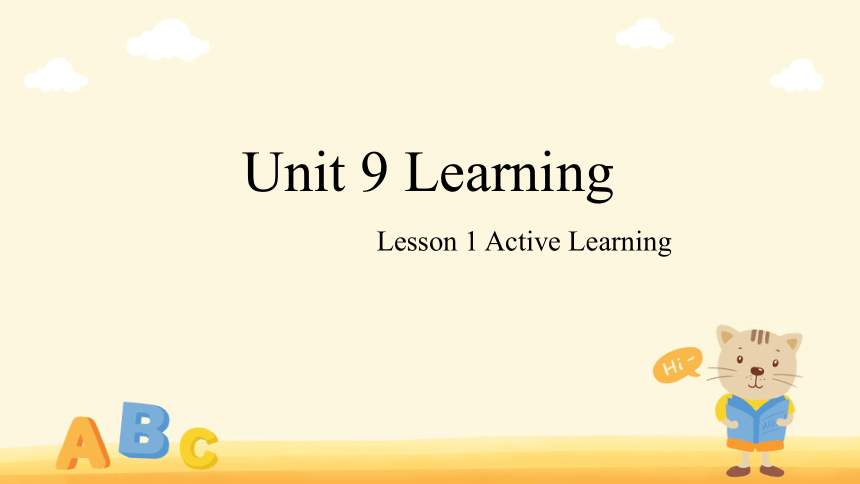 | |
| 格式 | pptx | ||
| 文件大小 | 1.1MB | ||
| 资源类型 | 教案 | ||
| 版本资源 | 北师大版(2019) | ||
| 科目 | 英语 | ||
| 更新时间 | 2022-09-09 17:33:20 | ||
图片预览

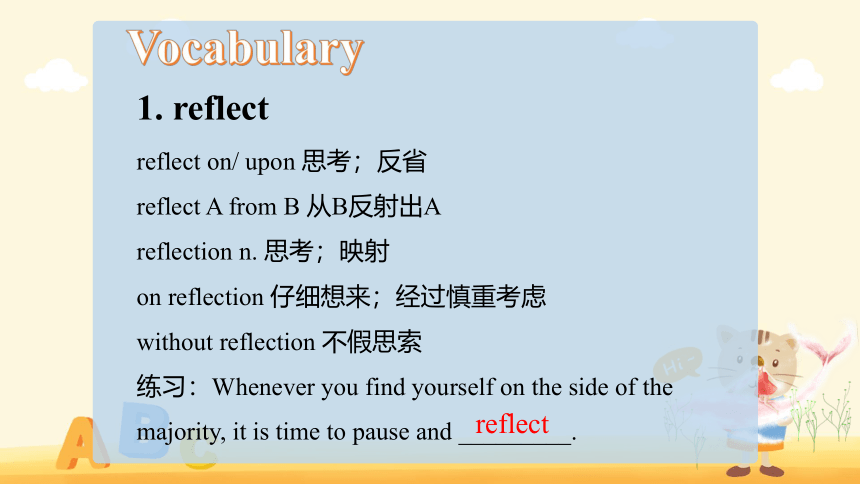
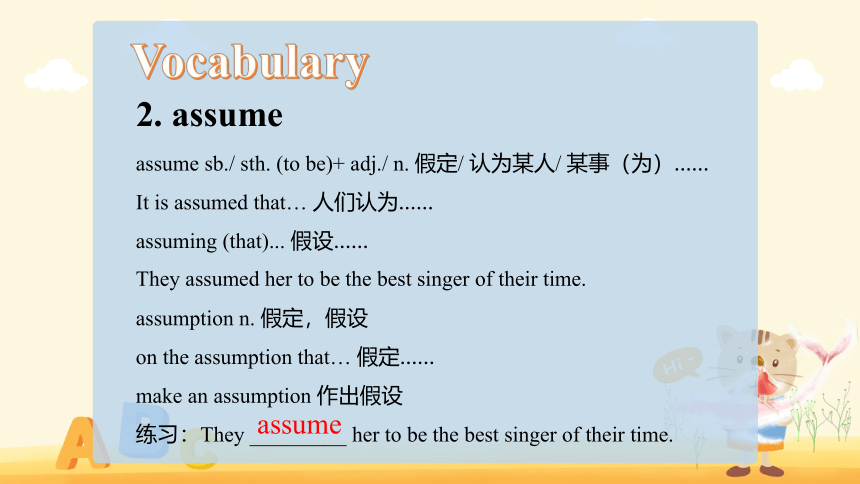
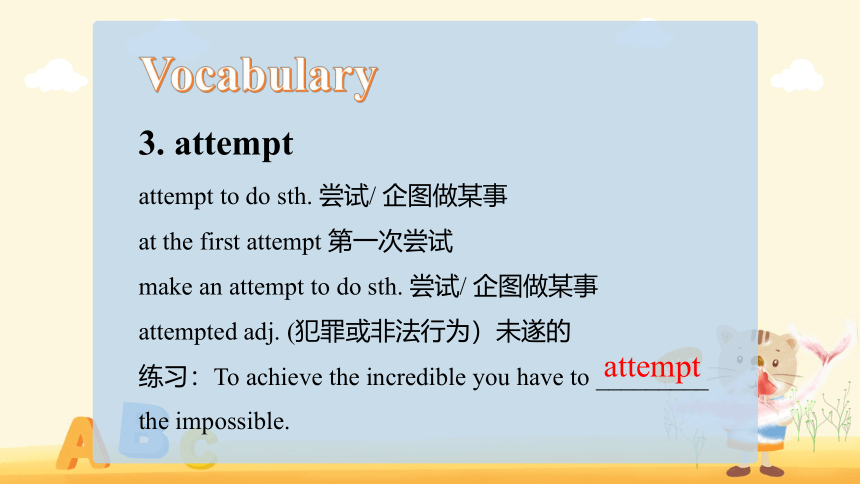
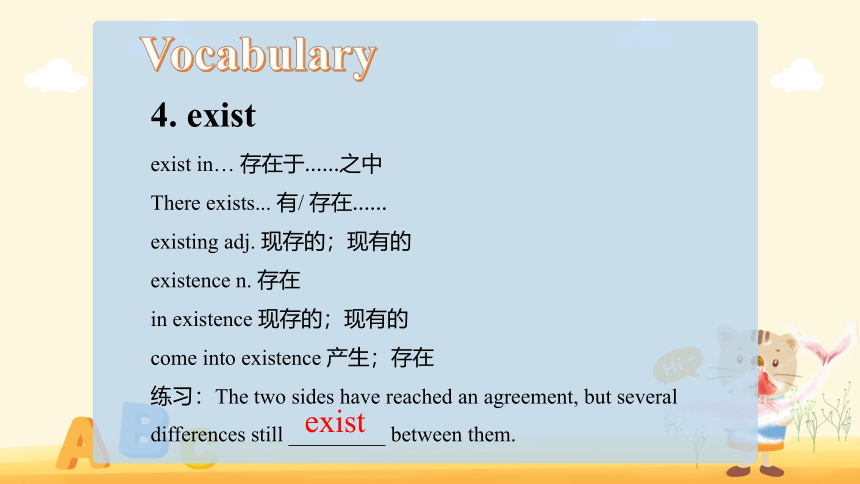
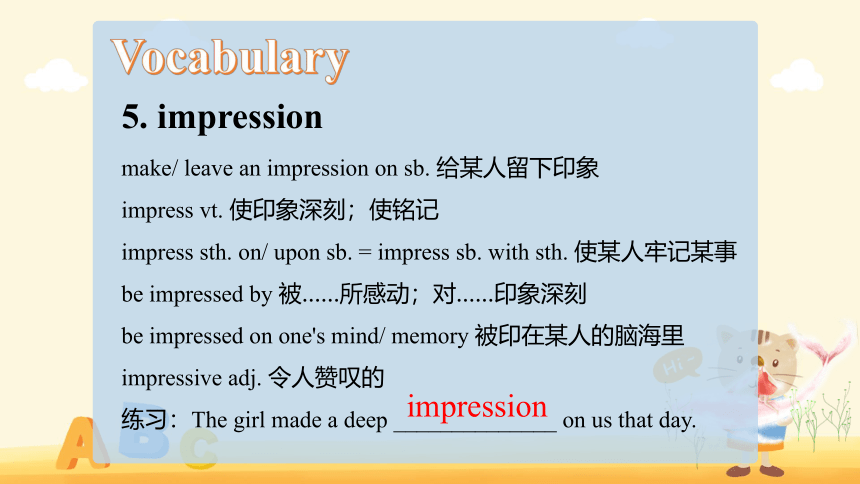
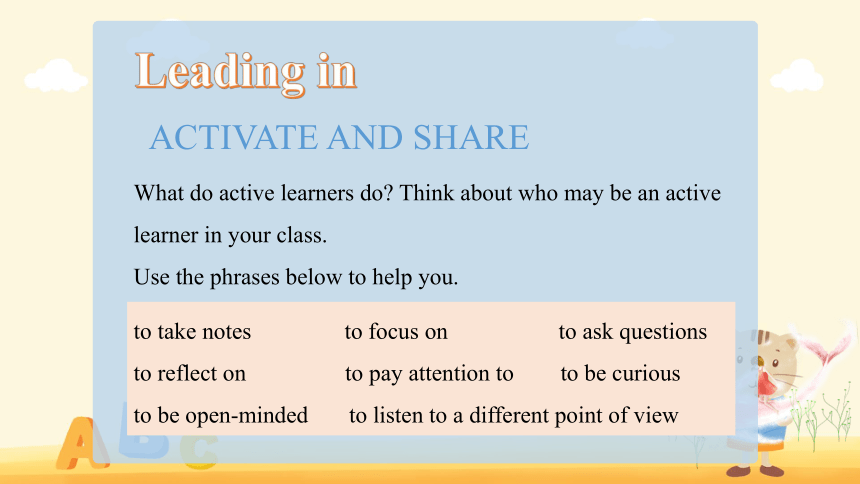

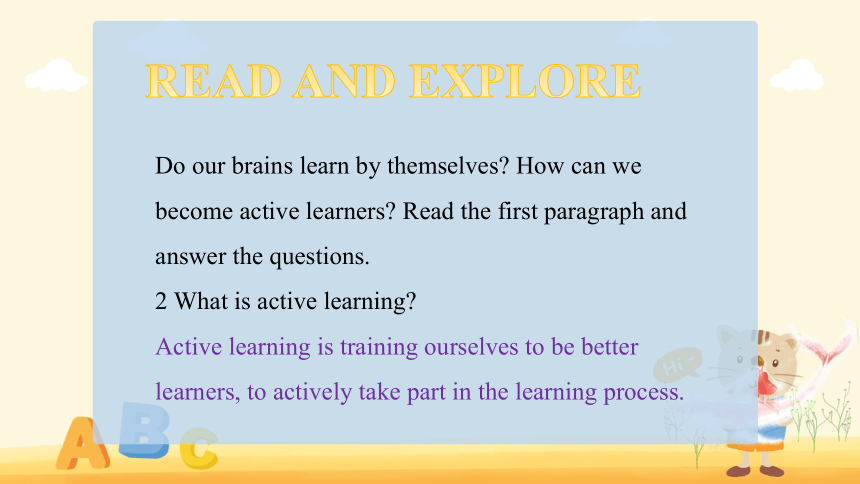
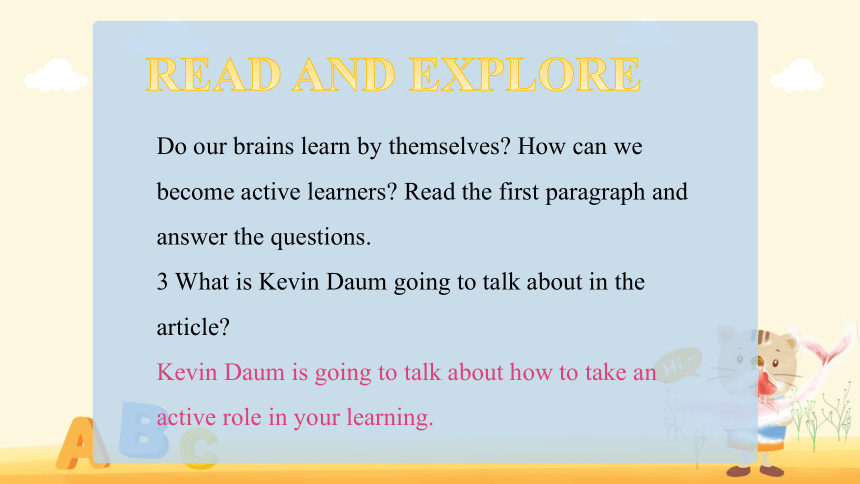
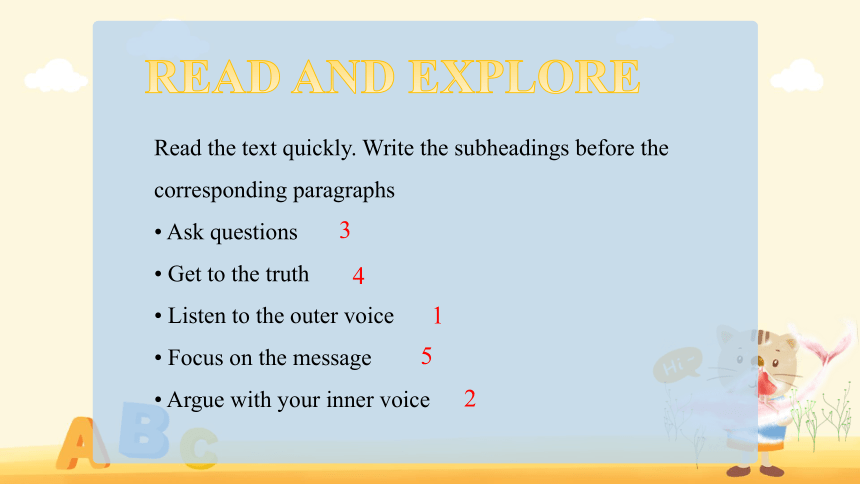
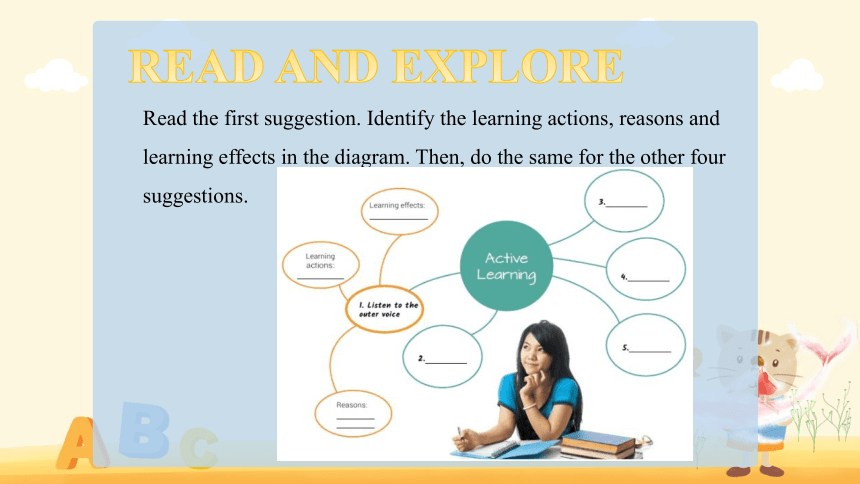
文档简介
(共36张PPT)
Unit 9 Learning
Lesson 1 Active Learning
Vocabulary
1. reflect
reflect on/ upon 思考;反省
reflect A from B 从B反射出A
reflection n. 思考;映射
on reflection 仔细想来;经过慎重考虑
without reflection 不假思索
练习:Whenever you find yourself on the side of the majority, it is time to pause and _________.
reflect
2. assume
assume sb./ sth. (to be)+ adj./ n. 假定/ 认为某人/ 某事(为)……
It is assumed that… 人们认为……
assuming (that)... 假设……
They assumed her to be the best singer of their time.
assumption n. 假定,假设
on the assumption that… 假定……
make an assumption 作出假设
练习:They _________ her to be the best singer of their time.
Vocabulary
assume
3. attempt
attempt to do sth. 尝试/ 企图做某事
at the first attempt 第一次尝试
make an attempt to do sth. 尝试/ 企图做某事
attempted adj. (犯罪或非法行为)未遂的
练习:To achieve the incredible you have to _________ the impossible.
attempt
Vocabulary
Vocabulary
4. exist
exist in… 存在于……之中
There exists... 有/ 存在……
existing adj. 现存的;现有的
existence n. 存在
in existence 现存的;现有的
come into existence 产生;存在
练习:The two sides have reached an agreement, but several differences still _________ between them.
exist
5. impression
make/ leave an impression on sb. 给某人留下印象
impress vt. 使印象深刻;使铭记
impress sth. on/ upon sb. = impress sb. with sth. 使某人牢记某事
be impressed by 被……所感动;对……印象深刻
be impressed on one's mind/ memory 被印在某人的脑海里
impressive adj. 令人赞叹的
练习:The girl made a deep ______________ on us that day.
impression
Vocabulary
What do active learners do Think about who may be an active learner in your class.
Use the phrases below to help you.
ACTIVATE AND SHARE
to take notes to focus on to ask questions
to reflect on to pay attention to to be curious
to be open-minded to listen to a different point of view
Leading in
Do our brains learn by themselves How can we become active learners Read the first paragraph and answer the questions.
1 What do most people believe about the human brain Is it true
Most people believe that our brain learns automatically. But, it's not true.
READ AND EXPLORE
Do our brains learn by themselves How can we become active learners Read the first paragraph and answer the questions.
2 What is active learning
Active learning is training ourselves to be better learners, to actively take part in the learning process.
READ AND EXPLORE
Do our brains learn by themselves How can we become active learners Read the first paragraph and answer the questions.
3 What is Kevin Daum going to talk about in the article
Kevin Daum is going to talk about how to take an active role in your learning.
READ AND EXPLORE
Read the text quickly. Write the subheadings before the corresponding paragraphs
Ask questions
Get to the truth
Listen to the outer voice
Focus on the message
Argue with your inner voice
READ AND EXPLORE
1
2
3
4
5
Read the first suggestion. Identify the learning actions, reasons and learning effects in the diagram. Then, do the same for the other four suggestions.
READ AND EXPLORE
Group Work
Each student chooses one suggestion and introduces it to others.
READ AND EXPLORE
Are the following ways of learning correct according to Kevin Daum Write T (true) or F (false). If not, what should we do Why
1 When in class, focus on the voice expressing your own opinion. ( )
2 If you think a speaker is wrong, argue with him / her. ( )
3 Be curious to find more information about the topic. ( )
4 Believe what is said in books. ( )
5 Only engage in classes of your favourite teacher's. ( )
READ AND EXPLORE
F
F
T
F
F
Which of the suggestions in the text do you think is the most useful for you Why Do you have any questions about those suggestions
Example I think "arguing with your inner voice" is the most useful, because it makes me consider the other side of an argument.
READ AND EXPLORE
Read the summary. Use the phrases below to replace the underlined parts.
READ AND EXPLORE
In short based on at the heart of attempt to argue with achieve a higher level of understanding get in the way of learning
There are many things we can do to become better learners. We all have two voices. Our inner voice tells us personal opinions and our outer voice deals with others' opinions and things we have heard. If we listen to our inner voice too much, it can 1 block us from learning. If your inner voice is difficult to control, you can 2 disagree with it.
Read the summary. Use the phrases below to replace the underlined parts.
READ AND EXPLORE
In short based on at the heart of attempt to argue with achieve a higher level of understanding get in the way of learning
One of the best ways to promote active learning is to ask questions. This helps you 3 gain more knowledge about a topic. 4 In a word, we should never stop being curious. Active learners also 5 try to question the world around them and understand the truth 6 deep within every idea. Finally, as active learners, we should never form opinions about people 7 on the basis of first impressions.
Read the summary. Use the phrases below to replace the underlined parts.
READ AND EXPLORE
1 get in the way of learning
2 argue with
3 achieve a higher level of understanding
4 In short
5 attempt to
6 at the heart of
7 based on
FOCUS ON LANGUAGE: VERBS FOLLOWED BY VERB-ING FORM OR INFINITIVE
Look at the coloured verbs in the plete the table.
Verb + verb-ing form Verb + infinitive
suggest doing need to do
Add the following verbs to the table above. Use a dictionary to help you.
advise agree avoid can't stand don't mind enjoy start
help like manage practice regret seem remember
FOCUS ON LANGUAGE: VERBS FOLLOWED BY VERB-ING FORM OR INFINITIVE
Look at the coloured verbs in the plete the table.
Verb + verb-ing form Verb + infinitive
suggest, keep, risk, end up, try, cannot help, advise, avoid, can't stand, don't mind, enjoy, start, like, practise, regret, remember
need, attempt, try, refuse, agree, start, help, like, manage, regret, seem, remember
Recently, I've managed 1 ____________ (become) a more active learner. When I'm reading a book or listening to my teacher, I try 2 ____________ (forget) what I've learnt before or what I think about the book or the person giving me the information and practise 3 ________________ (concentrate) on the information itself. At the beginning, I found it difficult to do this and I couldn't help 4 ____________ (question) the
to become
to forget
concentrating
questioning
FOCUS ON LANGUAGE: VERBS FOLLOWED BY VERB-ING FORM OR INFINITIVE
ideas I was reading or hearing. But now I've learnt to avoid 5 ____________ (listen) to my inner voice all the time and sometimes I even argue with it. On the other hand, I also attempt 6 ____________ (ask) as many questions as I can. I ask my teachers a lot of questions and I've noticed that the answers to the questions have really helped me understand the topic a lot better.
listening
to ask
FOCUS ON LANGUAGE: VERBS FOLLOWED BY VERB-ING FORM OR INFINITIVE
Group Work What other ways of active learning do you know How will you learn actively in the future Make a list and explain pare and discuss your list with your group members.
EXPRESS YOURSELF
1. 下列动词只能用不定式作宾语:
决心学会想希望,拒绝设法愿假装。
主动答应选计划,同意请求帮一帮。
decide/ determine, learn, want, expect/ hope/ wish;
refuse, manage, care, pretend;
offer, promise, choose, plan;
agree, ask/ beg, help。
语法:不定式和动名词作宾语
1. 下列动词只能用不定式作宾语:
此外,afford, strive, happen, wait, threaten等也要用不定式作宾语。
By all appearances, my choice of careers seems to have worked out.
显然,我对职业生涯的选择似乎是成功的。
语法:不定式和动名词作宾语
2. 下列动词或词组只能用动名词作宾语:
考虑建议盼原谅,承认推迟没得想。
避免错过继续练,否认完成就欣赏。
禁止想象才冒险,不禁介意准逃亡。
consider, suggest/ advise, look forward to, excuse/ pardon; admit, delay/ put off, fancy;
avoid, miss, keep/ keep on, practise; deny, finish, enjoy/ appreciate;
forbid, imagine, risk; can't help, mind, allow/ permit, escape。
语法:不定式和动名词作宾语
2. 下列动词或词组只能用动名词作宾语:
另外,be used/ accustomed to, lead to, devote to, go back to, stick to, object to, get down to, pay attention to, can't stand, give up, feel like, insist on, thank...for, apologize for, be busy (in) , have difficulty/ trouble (in), have a good/ wonderful/ hard time (in), spend time (in)等短语和动词词组后也要用动名词作宾语。
I appreciate having been given the opportunity to study abroad two years ago.
我非常感激两年前被给予了出国学习的机会。
语法:不定式和动名词作宾语
3. 下列动词或词组既可以跟动名词作宾语,也可以跟不定式作宾语,但意义上有区别。
forget to do sth. 忘记要做某事
forget doing sth. 忘记已经做过某事
regret to do sth. 对即将做的事表示遗憾(未做)
regret doing sth. 对做过的事表示后悔(已做)
语法:不定式和动名词作宾语
3. 下列动词或词组既可以跟动名词作宾语,也可以跟不定式作宾语,但意义上有区别。
try to do sth. 尽力去做某事
try doing sth. 试着做某事
go on to do sth. 继续做另一件事
go on doing sth. 继续做原来做的事
语法:不定式和动名词作宾语
3. 下列动词或词组既可以跟动名词作宾语,也可以跟不定式作宾语,但意义上有区别。
remember to do sth. 记着去做某事(未做)
remember doing sth. 记着做了某事(已做)
mean to do sth. 打算做某事
mean doing sth. 意味着做某事
语法:不定式和动名词作宾语
3. 下列动词或词组既可以跟动名词作宾语,也可以跟不定式作宾语,但意义上有区别。
What a poor memory! I forgot borrowing money from him yesterday. But today I forgot to return the money to him.
多么差的记忆力!我忘了昨天向他借过钱,但今天我又忘了把钱还给他。
语法:不定式和动名词作宾语
4. 固定句型
(1) There is no good/ point/ sense/ harm + doing sth.
(2) have difficulty /trouble/ a problem/ a hard time/ a good time/ fun (+in) + doing sth.
(3) spend/ waste time (in) doing sth.
语法:不定式和动名词作宾语
4. 固定句型
(4) cannot help but do, can do nothing but do, have no choice/ alternative but to do表示“不得不”。
(5) “Why not+动词原形?”表示向某人提出建议,意为“为什么不……?”
(6)“would rather/ had better (+not)+动词原形”意为“宁愿/ 最好(不)做某事”。
语法:不定式和动名词作宾语
练习
1. The bird was lucky and it just missed _____________ (catch).
2. ___________ (make) friends is a necessary part in our life.
3. They are considering ___________ (go) to Hainan for the summer holiday.
4. She sometimes can't help ______________________ (persuade) into buying more clothes than necessary.
being caught
Making
going
being persuaded
练习
5. ___________ (ignore) the difference between the two research findings will be one of the worst mistakes you make.
6. He is so stubborn, so it's no use ___________ (talk) to him again.
7. The girl dreams of there ___________ (be) a chance to go abroad for education.
8. After a long talk, the boy admitted __________________________ (cheat) in the last exam.
Ignoring
talking
being
cheating/ having cheated
THANK YOU!
Unit 9 Learning
Lesson 1 Active Learning
Vocabulary
1. reflect
reflect on/ upon 思考;反省
reflect A from B 从B反射出A
reflection n. 思考;映射
on reflection 仔细想来;经过慎重考虑
without reflection 不假思索
练习:Whenever you find yourself on the side of the majority, it is time to pause and _________.
reflect
2. assume
assume sb./ sth. (to be)+ adj./ n. 假定/ 认为某人/ 某事(为)……
It is assumed that… 人们认为……
assuming (that)... 假设……
They assumed her to be the best singer of their time.
assumption n. 假定,假设
on the assumption that… 假定……
make an assumption 作出假设
练习:They _________ her to be the best singer of their time.
Vocabulary
assume
3. attempt
attempt to do sth. 尝试/ 企图做某事
at the first attempt 第一次尝试
make an attempt to do sth. 尝试/ 企图做某事
attempted adj. (犯罪或非法行为)未遂的
练习:To achieve the incredible you have to _________ the impossible.
attempt
Vocabulary
Vocabulary
4. exist
exist in… 存在于……之中
There exists... 有/ 存在……
existing adj. 现存的;现有的
existence n. 存在
in existence 现存的;现有的
come into existence 产生;存在
练习:The two sides have reached an agreement, but several differences still _________ between them.
exist
5. impression
make/ leave an impression on sb. 给某人留下印象
impress vt. 使印象深刻;使铭记
impress sth. on/ upon sb. = impress sb. with sth. 使某人牢记某事
be impressed by 被……所感动;对……印象深刻
be impressed on one's mind/ memory 被印在某人的脑海里
impressive adj. 令人赞叹的
练习:The girl made a deep ______________ on us that day.
impression
Vocabulary
What do active learners do Think about who may be an active learner in your class.
Use the phrases below to help you.
ACTIVATE AND SHARE
to take notes to focus on to ask questions
to reflect on to pay attention to to be curious
to be open-minded to listen to a different point of view
Leading in
Do our brains learn by themselves How can we become active learners Read the first paragraph and answer the questions.
1 What do most people believe about the human brain Is it true
Most people believe that our brain learns automatically. But, it's not true.
READ AND EXPLORE
Do our brains learn by themselves How can we become active learners Read the first paragraph and answer the questions.
2 What is active learning
Active learning is training ourselves to be better learners, to actively take part in the learning process.
READ AND EXPLORE
Do our brains learn by themselves How can we become active learners Read the first paragraph and answer the questions.
3 What is Kevin Daum going to talk about in the article
Kevin Daum is going to talk about how to take an active role in your learning.
READ AND EXPLORE
Read the text quickly. Write the subheadings before the corresponding paragraphs
Ask questions
Get to the truth
Listen to the outer voice
Focus on the message
Argue with your inner voice
READ AND EXPLORE
1
2
3
4
5
Read the first suggestion. Identify the learning actions, reasons and learning effects in the diagram. Then, do the same for the other four suggestions.
READ AND EXPLORE
Group Work
Each student chooses one suggestion and introduces it to others.
READ AND EXPLORE
Are the following ways of learning correct according to Kevin Daum Write T (true) or F (false). If not, what should we do Why
1 When in class, focus on the voice expressing your own opinion. ( )
2 If you think a speaker is wrong, argue with him / her. ( )
3 Be curious to find more information about the topic. ( )
4 Believe what is said in books. ( )
5 Only engage in classes of your favourite teacher's. ( )
READ AND EXPLORE
F
F
T
F
F
Which of the suggestions in the text do you think is the most useful for you Why Do you have any questions about those suggestions
Example I think "arguing with your inner voice" is the most useful, because it makes me consider the other side of an argument.
READ AND EXPLORE
Read the summary. Use the phrases below to replace the underlined parts.
READ AND EXPLORE
In short based on at the heart of attempt to argue with achieve a higher level of understanding get in the way of learning
There are many things we can do to become better learners. We all have two voices. Our inner voice tells us personal opinions and our outer voice deals with others' opinions and things we have heard. If we listen to our inner voice too much, it can 1 block us from learning. If your inner voice is difficult to control, you can 2 disagree with it.
Read the summary. Use the phrases below to replace the underlined parts.
READ AND EXPLORE
In short based on at the heart of attempt to argue with achieve a higher level of understanding get in the way of learning
One of the best ways to promote active learning is to ask questions. This helps you 3 gain more knowledge about a topic. 4 In a word, we should never stop being curious. Active learners also 5 try to question the world around them and understand the truth 6 deep within every idea. Finally, as active learners, we should never form opinions about people 7 on the basis of first impressions.
Read the summary. Use the phrases below to replace the underlined parts.
READ AND EXPLORE
1 get in the way of learning
2 argue with
3 achieve a higher level of understanding
4 In short
5 attempt to
6 at the heart of
7 based on
FOCUS ON LANGUAGE: VERBS FOLLOWED BY VERB-ING FORM OR INFINITIVE
Look at the coloured verbs in the plete the table.
Verb + verb-ing form Verb + infinitive
suggest doing need to do
Add the following verbs to the table above. Use a dictionary to help you.
advise agree avoid can't stand don't mind enjoy start
help like manage practice regret seem remember
FOCUS ON LANGUAGE: VERBS FOLLOWED BY VERB-ING FORM OR INFINITIVE
Look at the coloured verbs in the plete the table.
Verb + verb-ing form Verb + infinitive
suggest, keep, risk, end up, try, cannot help, advise, avoid, can't stand, don't mind, enjoy, start, like, practise, regret, remember
need, attempt, try, refuse, agree, start, help, like, manage, regret, seem, remember
Recently, I've managed 1 ____________ (become) a more active learner. When I'm reading a book or listening to my teacher, I try 2 ____________ (forget) what I've learnt before or what I think about the book or the person giving me the information and practise 3 ________________ (concentrate) on the information itself. At the beginning, I found it difficult to do this and I couldn't help 4 ____________ (question) the
to become
to forget
concentrating
questioning
FOCUS ON LANGUAGE: VERBS FOLLOWED BY VERB-ING FORM OR INFINITIVE
ideas I was reading or hearing. But now I've learnt to avoid 5 ____________ (listen) to my inner voice all the time and sometimes I even argue with it. On the other hand, I also attempt 6 ____________ (ask) as many questions as I can. I ask my teachers a lot of questions and I've noticed that the answers to the questions have really helped me understand the topic a lot better.
listening
to ask
FOCUS ON LANGUAGE: VERBS FOLLOWED BY VERB-ING FORM OR INFINITIVE
Group Work What other ways of active learning do you know How will you learn actively in the future Make a list and explain pare and discuss your list with your group members.
EXPRESS YOURSELF
1. 下列动词只能用不定式作宾语:
决心学会想希望,拒绝设法愿假装。
主动答应选计划,同意请求帮一帮。
decide/ determine, learn, want, expect/ hope/ wish;
refuse, manage, care, pretend;
offer, promise, choose, plan;
agree, ask/ beg, help。
语法:不定式和动名词作宾语
1. 下列动词只能用不定式作宾语:
此外,afford, strive, happen, wait, threaten等也要用不定式作宾语。
By all appearances, my choice of careers seems to have worked out.
显然,我对职业生涯的选择似乎是成功的。
语法:不定式和动名词作宾语
2. 下列动词或词组只能用动名词作宾语:
考虑建议盼原谅,承认推迟没得想。
避免错过继续练,否认完成就欣赏。
禁止想象才冒险,不禁介意准逃亡。
consider, suggest/ advise, look forward to, excuse/ pardon; admit, delay/ put off, fancy;
avoid, miss, keep/ keep on, practise; deny, finish, enjoy/ appreciate;
forbid, imagine, risk; can't help, mind, allow/ permit, escape。
语法:不定式和动名词作宾语
2. 下列动词或词组只能用动名词作宾语:
另外,be used/ accustomed to, lead to, devote to, go back to, stick to, object to, get down to, pay attention to, can't stand, give up, feel like, insist on, thank...for, apologize for, be busy (in) , have difficulty/ trouble (in), have a good/ wonderful/ hard time (in), spend time (in)等短语和动词词组后也要用动名词作宾语。
I appreciate having been given the opportunity to study abroad two years ago.
我非常感激两年前被给予了出国学习的机会。
语法:不定式和动名词作宾语
3. 下列动词或词组既可以跟动名词作宾语,也可以跟不定式作宾语,但意义上有区别。
forget to do sth. 忘记要做某事
forget doing sth. 忘记已经做过某事
regret to do sth. 对即将做的事表示遗憾(未做)
regret doing sth. 对做过的事表示后悔(已做)
语法:不定式和动名词作宾语
3. 下列动词或词组既可以跟动名词作宾语,也可以跟不定式作宾语,但意义上有区别。
try to do sth. 尽力去做某事
try doing sth. 试着做某事
go on to do sth. 继续做另一件事
go on doing sth. 继续做原来做的事
语法:不定式和动名词作宾语
3. 下列动词或词组既可以跟动名词作宾语,也可以跟不定式作宾语,但意义上有区别。
remember to do sth. 记着去做某事(未做)
remember doing sth. 记着做了某事(已做)
mean to do sth. 打算做某事
mean doing sth. 意味着做某事
语法:不定式和动名词作宾语
3. 下列动词或词组既可以跟动名词作宾语,也可以跟不定式作宾语,但意义上有区别。
What a poor memory! I forgot borrowing money from him yesterday. But today I forgot to return the money to him.
多么差的记忆力!我忘了昨天向他借过钱,但今天我又忘了把钱还给他。
语法:不定式和动名词作宾语
4. 固定句型
(1) There is no good/ point/ sense/ harm + doing sth.
(2) have difficulty /trouble/ a problem/ a hard time/ a good time/ fun (+in) + doing sth.
(3) spend/ waste time (in) doing sth.
语法:不定式和动名词作宾语
4. 固定句型
(4) cannot help but do, can do nothing but do, have no choice/ alternative but to do表示“不得不”。
(5) “Why not+动词原形?”表示向某人提出建议,意为“为什么不……?”
(6)“would rather/ had better (+not)+动词原形”意为“宁愿/ 最好(不)做某事”。
语法:不定式和动名词作宾语
练习
1. The bird was lucky and it just missed _____________ (catch).
2. ___________ (make) friends is a necessary part in our life.
3. They are considering ___________ (go) to Hainan for the summer holiday.
4. She sometimes can't help ______________________ (persuade) into buying more clothes than necessary.
being caught
Making
going
being persuaded
练习
5. ___________ (ignore) the difference between the two research findings will be one of the worst mistakes you make.
6. He is so stubborn, so it's no use ___________ (talk) to him again.
7. The girl dreams of there ___________ (be) a chance to go abroad for education.
8. After a long talk, the boy admitted __________________________ (cheat) in the last exam.
Ignoring
talking
being
cheating/ having cheated
THANK YOU!
同课章节目录
- Unit 7 Art
- Lesson 1 Masterpieces
- Lesson 2 Beijing Opera
- Lesson 3 A Musical Genius
- Unit 8 Green living
- Lesson 1 Roots and Shoots
- Lesson 2 Greening the Desert
- Lesson 3 "White Bikes" on the Road
- Unit 9 Learning
- Lesson 1 Active Learning
- Lesson 2 Language Learning Tips
- Lesson 3 The Secrets of Your Memory
